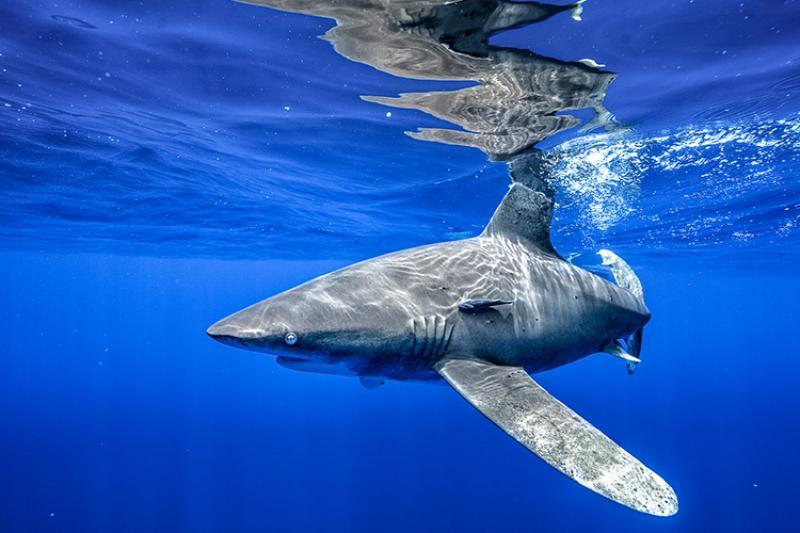
New rule focuses on improving survival of hooked oceanic whitetip sharks
by NOAA Fisheries 7 May 2022 08:17 PDT

The oceanic whitetip shark's scientific name—Carcharhinus longimanus—comes from its long, rounded pectoral fin (Longimanus translates to “long hands”) © Andy Mann
NOAA Fisheries, working with Hawaii longline fishermen and the Western Pacific Fishery Management Council, has taken a big step in protecting threatened oceanic whitetip sharks.
A new regulation, effective May 31, 2022, prohibits the use of wire leaders in the Hawaii deep-set longline fishery in favor of monofilament nylon leaders. This is a change that longline fishermen started on their own in November 2020.
Oceanic whitetip sharks were once one of the most abundant sharks in the ocean. Today, they are listed as threatened under the Endangered Species Act. Oceanic whitetips are top predators and play a critical role in the ecosystem by maintaining the populations of species below them in the food chain. In the hunt for a meal, oceanic whitetips are sometimes caught unintentionally (or hooked) in longline fisheries as bycatch—one of the greatest threats to their survival. The switch to nylon leaders is estimated to increase the survival rates of hooked whitetips by more than 30 percent!
"The Hawaii fishing fleet sets the standard for longline tuna fishing, with high levels of observer coverage and strong regulations to limit the effects of the fishery on protected species," said Michael Tosatto, Regional Administrator, NOAA Fisheries Pacific Islands Regional Office. "These new regulations to protect oceanic whitetip sharks continue this long legacy of responsible fishing in the Pacific Islands region. We hope fishing fleets around the world will adopt these practices."
Leading with nylon
Wire leaders are short lengths of metal wire fishing line that attach the rest of the fishing line to the baited hook. They help prevent fish teeth from cutting through the line and make the fishing gear safer for fishermen.
The challenge is that these wire leaders prevent even sharp-toothed oceanic whitetip sharks from cutting themselves free when hooked. Stuck on the line, these sharks must rely on fishermen to release them—an altogether taxing experience that reduces the sharks' survival chances and can be dangerous for fishermen.
With nylon leaders, the sharks can better bite through the line and free themselves. And if a caught shark doesn't bite through the nylon, fishermen can free the shark by cutting the line close to the hook. Research suggests hooks work their way out or rust away over time, with little consequence to the animal.
An industry-led effort
The new shark-saving regulation would not have been possible without the help of the local fishing industry and the Western Pacific Fishery Management Council.
The Hawaii Longline Association, an organization that represents the interests of tuna longline fishermen in the area, took the initiative to stop using wire leaders when deep-set longline fishing. Members voluntarily phased out wire leaders starting in November 2020, according to HLA Executive Director Eric Kingma.
"Our members—which include all of the Hawaii-based longline fleet of around 145 vessels—don't want to catch sharks," Kingma said. "While the amount of fishing effort by Hawaii vessels is small compared with foreign fleets, we continue to work with our members and researchers on innovative methods to minimize the impacts of our fishery on these sharks and other protected species."
In 2020, the Council formed a diverse working group of scientists, resource managers, fishery experts, and fishermen to address impacts to oceanic whitetip sharks. The working group endorsed the industry's proposal to end the use of wire leaders and recognized it as a way to reduce post-release mortality.
"Conservation measures are most successful when the affected fishermen are involved from the beginning," said Council Executive Director Kitty Simonds. "The HLA initiative to adopt nylon leaders is a practical and effective solution, and a great example of the Magnuson-Stevens Act bottom-up process in action."
In June 2021, the Council recommended that NOAA create regulations to prohibit wire leaders in the Hawaii deep-set longline fishery. It also recommended requiring fishermen in all Western Pacific longline fisheries to remove as much fishing gear as possible from released oceanic whitetip sharks. On May 31, 2022, these regulations will go into effect in the Pacific Islands region.
These regulations, stemming from the initiative of Hawaii longline fishermen, will serve as an example of best practices in longline fisheries to other longline fleets. These practices need to be adopted worldwide to protect these magnificent sharks.